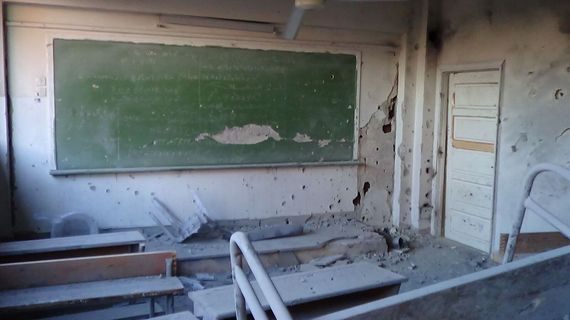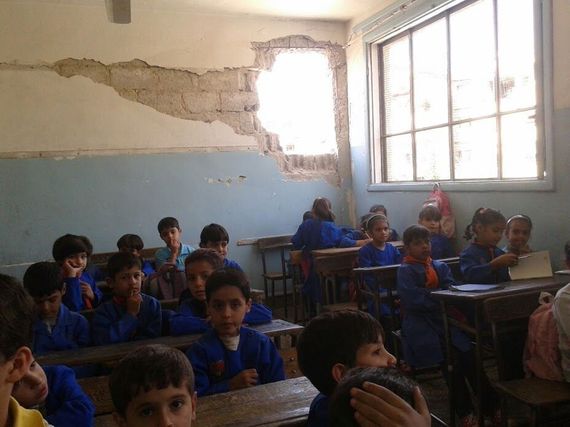About Through Their Voices serial stories:Moaddamiyeh has been an early hotspot for anti-Assad demonstrations and the following government oppression. The town has endured the siege of the Assad regime since the end of 2012, and it is one of towns hit by chemical weapons in August 2013. Despite all the violence these activists believe in the principle of peaceful. And after five years of Syrian revolution their stories and experiences must be heard, their words reflect their struggles and hopes. 10 stories will be told through their voices.

Rasheeda Dawood is an elementary school teacher in Moaddamiyeh. Rasheeda was grown up in a well-educated family. Her father and uncles had always been aware of the real face of the Assad family, making them prime targets for intelligence operations. Some of her family members were arrested several times for unknown reasons.
During weekly family dinners Rasheeda's family gave the appearance of an ordinary family, but their meetings were all about discussing politics in Syria and the Middle East.
"These meetings allowed for a safe space to discuss what we had in mind, but we believed it to be very hard to bring about change in Syria. The Assad family reigned for decades, controlling the central entities in Syria, the army and the intelligence branches. I think in Syria we might have more intelligence prisons than we have schools."
Since Bashar Al-Assad has ruled in Syria nothing has changed for Rasheeda and her family. All the stereotypes about him being a young educated doctor didn't change anything for them. But, it was worse for them when the constitution needed to be edited in 2000 when Assad the father died and Assad the son was only 34 years old. Until then, the constitution stated the elected president needed to be at least 40 years old. It was then changed to enable the rule of Bashar Al-Assad. He arranged elections, in which he was the only candidate. The Syrians could chose between Bashar Al-Assad and Bashar Al-Assad!
Since 1981 Rasheeda has worked as a teacher and during her long term of working in a governmental school, she had been called to the intelligence branches several times in order to be questioned about her manner and points of views.
And since the revolution started Rasheeda and her sister have never missed a single demonstration in Moaddamiyeh. They also tried to encourage other women in the city to speak up and be part of the peaceful movement.
"It's been five years and whenever I see a demonstration I still have the same feeling that I had the first time I was able to shout out 'Freedom, freedom.'It's been five years and we still want to go out and shout out the same slogans we proclaimed five years ago, and this is will never change."
In the following years they held meetings for women and young girls to discuss the situation and their role in the demonstrations and other anti-Assad activities.
During that time Rasheeda did not quit teaching, she believes that is one of her ways of fighting. Even the secondary and high school students were organizing their own demonstrations in Moaddamiyeh, which were held every day after school. Rasheeda kept worrying about those young students. She thought that she might not be able to stop them, but at least she could keep an eye on them. Several times Rasheeda was able to protect students from being arrested by the regime's militias.
"Once I grabbed a boy by his clothes and refused to let them take him because they are monsters! I shouted and never let go of the kid's jacket. 'Leave my son! Leave him now!' And that intelligence officer angrily replied that he had seen me many times claiming that I am the mother of some kid they were trying to take. And then he said in a sarcastic way: 'Are you the mother of all of them?', and I replied, 'Yes, I am! All the students here are my children!'."
Even though Rasheeda had the chance to leave before the siege became heavily enforced at the end of 2012, she refused to do so. She believes that she has a message to deliver and she gave an oath to herself to teach these kids and take care of them no matter how bad the situation might get.
"Those kids are the future of Syria. They are the most important element in the Syrian community and it is their future for which we have demonstrated. We don't want them to endure a third generation of the Assad family! "
After their destruction Rasheeda and her colleagues re-opened the schools in Moadamiyeh, and she is now voluntarily teaching the kids.
"The regime ruined most of the schools here because they are the real threat for them, but we reformed some of them with the minor resources that we had, and now we are working again! These people are unstoppable."
Rasheeda is currently teaching forty first-graders. Almost fifteen of her students have either lost one of their parents or have seen them being detained by the Assad regime. Each day Rasheeda tries to help these traumatized kids.
"It's no longer only about teaching; they need a lot of psychological care. They need love and a safe space. However, at times they are not able to get the amount of love and care they need because their parents are traumatized themselves. So, the kids are starving, they suffer from trauma and violence and they have missed a lot of education. There is a lot of work to do."
One of Rasheeda's students saw his father being killed by Assad's forces during one of the massacres in 2012. The child was spending a lot of time with Rasheeda, and he was never playing with his fellows. The child is always constantly imagining revenge scenarios, which he mistakenly believes to be utterly true. The boy always tells Rasheeda things like "Yesterday, I got a gun and then I went on the frontlines and I saw a soldier and I shot him dead for the sake of my father," or he presents alternate scenarios for the day his father was killed: "You know they killed dad that day, but then I stopped them and I got a knife from the kitchen and I killed them all." Rasheeda is convinced that she needs to fight the violence with love.
"For the last six months I was taking care of this child and I guess the improvement of his situation is quite slow, but I'm so proud of the level that we've reached. He is now less violent with his imaginary stories and he has made some attempts to improve his socializing with other children in school. We are not there yet! But I hope that we getting closer to recovery."
Yet, teaching traumatized and starving students takes its toll on Rasheeda and her fellows, but they have accommodated the curriculum, trying to use a lot of review in order to build a strong base of knowledge for the students.
One day humanitarian aid workers entered Moaddamiyeh and they brought biscuits for the kids. During break time some children refused to go outside playing because they were afraid their teachers would eat all their biscuits. Rasheeda heard them and advanced with a big smile on her face, assuring to them that she will not eat their biscuits.
"It was really sad and I tried not to cry, it is heartbreaking that our children are so afraid to lose their food. They are constantly thinking about food, coming to school with pale faces due to the malnutrition and the lack of vitamins."
A lot of children visit Rasheeda at her home, wondering whether she had some food to fill their empty stomachs.
"Once a student of mine came to my place and she was very hungry. She did not even have to ask before I gave her my daily share of bulgur. But the amount was not enough for her and she held the plate and started to lick it with her tongue to get the small escarps. I felt very bad because I didn't have anything else to give for her. I hugged her and she looked at me and said 'I love you! You are the best teacher in the world!' After 56 years on this earth I would have never imagined to go through this. To see a starving child, but to have nothing that could help is just torture.
After all that happened I'm trying to hang on and being able to give love and to be a good listener for forty children who are the love of my life. I just wish I could help them more and under better circumstances. I always tell them no matter what happens and no matter what will happen you can be anything you want! Deep inside of me I wish that the world would not have supported Assad! Nothing of this had happened if it didn't. But no matter what happened I can see the future of these children brightly shining in their eyes. They are smart, intelligent, creative and powerful despite everything that happened to them. And what is more, they are the future, and we need to take care of them."
Through Their Voices is published biweekly. Next time in The Voice of the Paramedic Ameenah A. Sawwan talks to Odai Mohammad, a law student who becomes a paramedic.
The Dreamer's Voice (1) and The Dreamer's Voice (2) are already online.
The story was originally published in German on WirMachenDas.Jetzt
